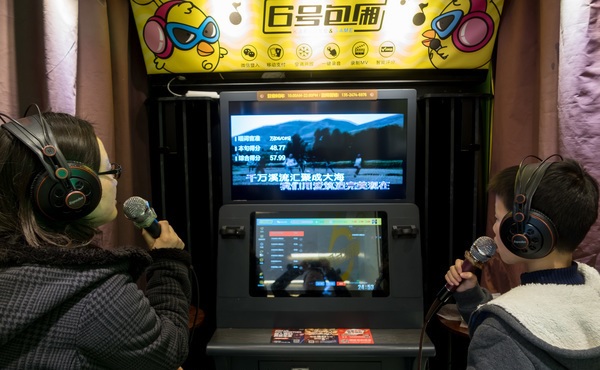
A mother and her son sing in a Mini KTV singing bar in a shopping mall in Yangpu district, Shanghai, March 2, 2019. (Photo: Sipa)
Karaoke outlets in Shanghai have been ordered to close following a spike in new COVID-19 infections linked to such facilities, local authorities announced on Wednesday.
Other entertainment businesses that operate within enclosed spaces such as chess rooms and murder mystery venues have also been reminded to strictly enforce epidemic prevention measures when they reopen or risk being shut down.
The city reported 24 locally transmitted COVID-19 cases on Tuesday, 15 of which are asymptomatic. Two places where the cases live and had visited have been designated as high risk areas. Another 22 locations linked to these cases have been classified as medium risk areas.
According to Zhao Dandan, deputy director of the Shanghai Health Commission, all the cases, along with infections added on Sunday and Monday, were related to a KTV outlet and a chess room on Lanxi road in Shanghai's Putuo district.
Jin Lei, deputy director of the Municipal Culture and Tourism Bureau, noted that it is still too risky to allow entertainment venues where people gather in enclosed spaces to reopen. He added that the bureau has been coordinating with local departments to conduct assessments on COVID-19 prevention and control in entertainment venues.
Since July 1, 25 art galleries, 29 museums, and 84 A-level scenic spots in the city have reopened their doors to the public.
Authorities have also approved the gradual reopening of performance venues and cinemas starting on July 8, according to Jin.
"We'll strengthen inspections for reopened places to offer a comfortable and safe cultural and tourism environment for citizens," he added.
In addition, local authorities have issued favorable policies, including rent reductions or exemptions, to help enterprises get through these tough times.
For example, 50 billion yuan ($7.46 billion) in credit will be offered to eligible cultural and tourism enterprises in the city courtesy of collaboration between the bureau and several banks, including Bank of China, China Construction Bank, and Shanghai Rural Commercial Bank.


